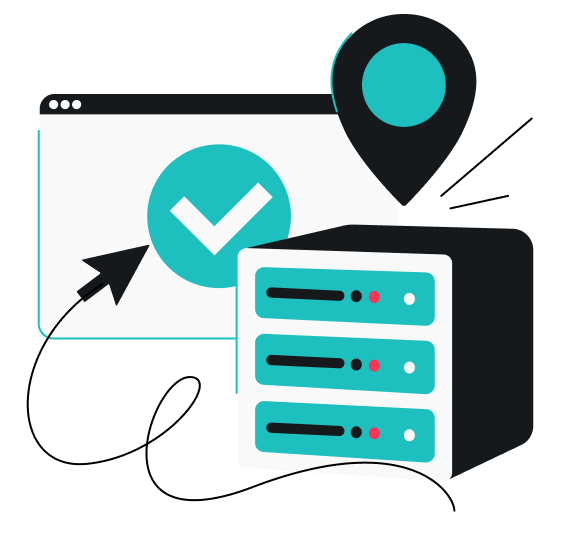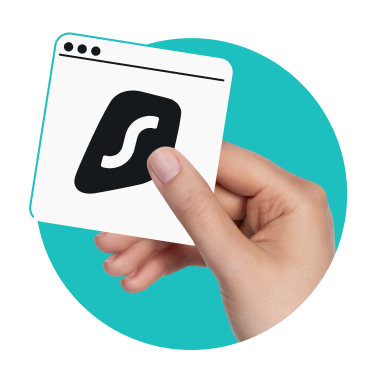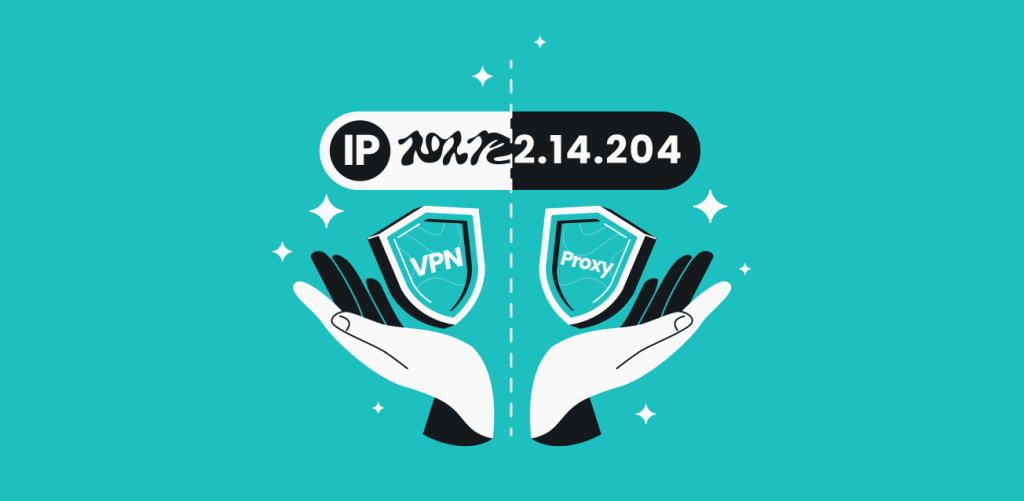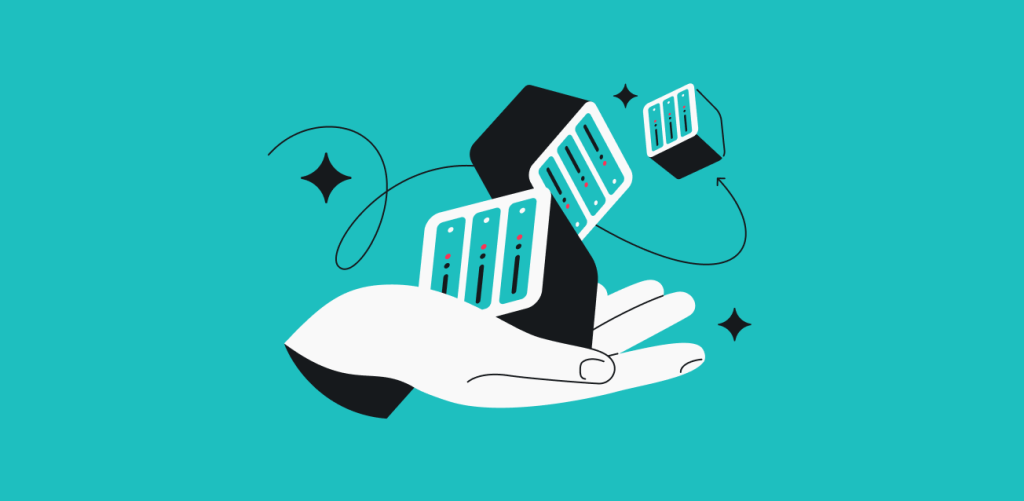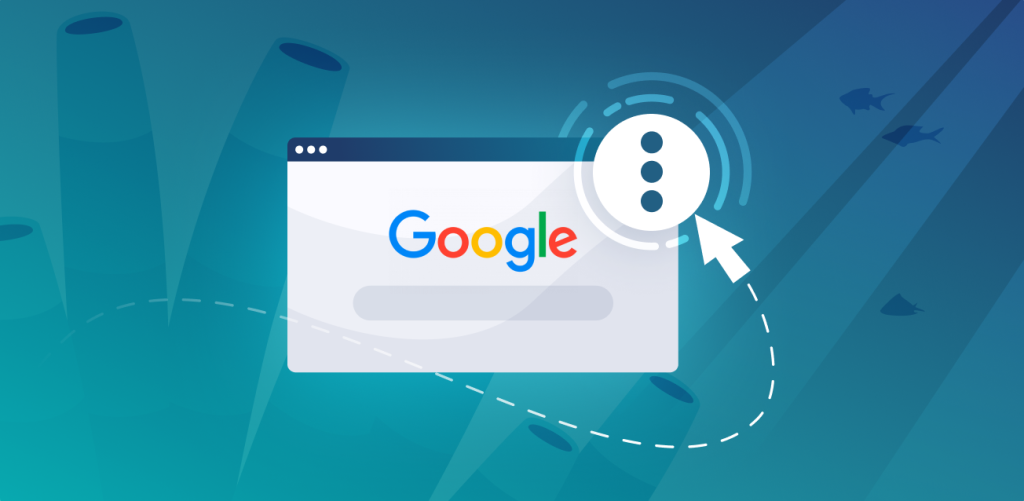A web proxy is an intermediary server that routes your internet traffic to mask your real IP address and make it appear that you’re browsing from a different location. While it is usually used to access content or control web usage in environments like schools or offices, its security benefits are limited. So, let’s learn what a proxy server does and whether it’s better than a VPN (Virtual Private Network).
How does a web proxy work?
A web proxy server acts as a middleman between your device and the internet. Instead of connecting directly to websites, your online requests pass through the proxy to mask your IP address. This way, the request appears to come from the proxy’s location, not yours. Here’s how:
- You type a web address (like www.surfshark.com) into your browser.
- Instead of reaching the website directly, your request is routed to the proxy server first.
- The proxy takes your request and sends it to the website on your behalf, using its IP address instead of yours.
- The site processes the request and sends the content (like a webpage) back to the proxy.
- The proxy server receives the content and forwards it to your browser.
Types of web proxies
Web proxy types differ in privacy and functionality levels. You can choose a specific proxy depending on your needs. Here are the main three types of proxies:
Transparent proxies
Transparent proxies intercept and manage internet traffic without changing or masking your original IP address. These proxies reveal themselves to the websites they connect to and pass along the user’s IP address.
In most cases, users are unaware they are connected through a transparent proxy because it doesn’t require manual setup. It works behind the scenes as an access control. However, since it doesn’t mask IP addresses, it doesn’t offer privacy and security to users and is more focused on traffic management than anonymity.
But before you think they’re useless, here’s the thing — they’re not. They are used widely in schools and libraries to filter content on their premises because they can block access to certain websites or restrict internet usage per organizational policies. So, this is an excellent way to monitor network activity for compliance.
Anonymous proxies
Anonymous proxies or anonymizers mask the user’s IP address to increase privacy. However, they still identify themselves as proxies to the websites they access. Although they don’t guarantee total invisibility, they prevent websites from collecting personal data that can be traced from a user’s IP address.
This may help you avoid tracking and minimize advertising profiling. But, it is important to note that anonymous proxies hide IP addresses and don’t encrypt data. So, your browsing activity could still be monitored on unsecured networks.
That’s why these proxies are mostly used by individual users to reduce targeted ads or access region-locked content by masking their identity.
High anonymity proxies
High anonymity proxies are also called elite proxies because they offer the highest privacy. They completely conceal a user’s IP address and do not disclose that a proxy is being used. That way it is extremely difficult for websites or other entities to track the user.
Here’s how they work — they rotate IP addresses or use random ones so that user activity cannot be easily linked or traced back to them. This makes them somewhat similar to a VPN since they also mask the user’s identity entirely. However, the main difference is that they don’t encrypt data, and due to the extra layers of protection, these proxies may be slower than others and can be costly if you use paid ones.
Web proxy vs. VPN
You may think that using a VPN is the same as using a proxy, but that’s not true. While they route your internet traffic through intermediary servers, VPNs and proxies function differently and provide different levels of security. Let’s go over their key differences:
IP masking vs. encryption
Proxies mask your IP address by rerouting only browser-based traffic through a proxy server. However, most proxies don’t encrypt the data they transmit, which means your information is vulnerable on unsecured networks.
On the other hand, VPNs replace your IP address with that of the VPN server while also encrypting all data transmitted from your device. This means that even if someone intercepts your traffic, they cannot read the encrypted content.
Security and privacy features
Proxies provide basic privacy by blocking some targeted ads and hiding your IP address, but they leave non-browser traffic (like app connections) unprotected. Anonymous proxies prevent identity tracking but may still reveal that a proxy is in use.
However, VPNs encrypt all network traffic, whether it’s coming from apps or websites, to give you full-proof security on private and public networks. They also prevent ISP (Internet Service Provider) tracking and protect against traffic-based bandwidth throttling (intentionally slowing internet speed to regulate network traffic or limit usage).
Use cases and performance
With proxies, you can access streaming services and subscriptions you’ve paid for while traveling abroad. They also save bandwidth by caching web content. However, proxies may slow network speed if multiple users share the same server.
On the contrary, VPNs change your location in a secure way, which is better for sensitive activities like online banking or browsing without any fear of your important details being leaked. Since they prevent ISPs from throttling bandwidth, you can use them for safe streaming or gaming as well. However, encryption may slow your speed a bit.
But we’ve already covered what you can do to avoid this. Check out our guide on how to boost your VPN speed.
Cost difference
Many proxies are free, especially public or shared ones. However, paid proxies (like residential or data center proxies) cost around $5 to $15 per month, depending on the features they offer.
VPNs are usually subscription-based and cost between $40 and $100 per year (roughly $3 to $12 per month). There are free VPNs, too, but they don’t provide benefits like faster speeds and high security. To overcome these issues, Surfshark VPN offers high-class security at affordable rates. So, if you’re looking for a VPN that is both secure and cost-effective, Surfshark can be your go-to pick.
Benefits of using a web proxy
If you are now wondering whether you should use a web proxy or not, here are some of its key benefits that can help you decide:
- Access your subscriptions abroad: stay connected to your paid streaming services and content while traveling by routing your connection through a proxy server;
- Masks IP for privacy: masks your real IP address from websites to increase anonymity and reduce tracking by advertisers;
- Provides control over internet usage: institutions like schools and businesses use proxies to filter content and monitor network traffic for compliance and productivity.
Limitations of a web proxy
Although a web proxy is helpful in many scenarios, it comes with several limitations too, such as:
- Lack of encryption: unlike VPNs, which provide end-to-end encryption to secure your data, web proxies do not encrypt data along the transmission path. This means your information is vulnerable to interception on unsecured networks, such as public Wi-Fi;
- Limited protection: proxies may not fully protect against other tracking forms, such as app tracking or advanced surveillance methods, because they only mask your IP address for browser-based traffic;
- Speed issues: depending on the proxy’s server load, internet connections may experience slower speeds, especially with free or shared proxies.
When to use a web proxy
A web proxy may not be as effective as a VPN, but it is still used worldwide for several reasons. Here are some major scenarios where a proxy can be your partner:
- International business research: marketers and researchers can view public online content that’s available in different regions for market analysis;
- Save bandwidth: organizations use proxies to cache regularly accessed websites to reduce load times and conserve bandwidth. This is especially needed in shared networks with many users;
- Control internet usage: schools, libraries, companies, and even parents can use transparent proxies to block access to certain websites that share unethical content or simply to monitor employee or student/children activity;
- Mask IP: if you’re watching a movie and don’t want to be aggressively exposed to targeted ads, you can use a proxy to hide your IP address and control your digital footprint;
- Test website performance: web developers can verify how their sites load and function from different server locations to ensure optimal user experience worldwide.
How to get a proxy server
Now that you know what a web proxy server is and how to use it, let’s see how to get a proxy server. Here are four reliable methods to get one:
- Free public proxies: you can search on Google for public proxy lists. These proxies are easy to access but may be slow or unreliable since they’re open to everyone;
- Paid proxy services: you can opt for premium proxy providers like NodeMaven, Bright Data, and IPRoyal. They may be expensive, but they provide better speed and security;
- Built-in proxies from web browsers: some browsers, like Opera or Google, have built-in proxies or VPN-like features to mask your IP address for free. Go to your browser settings and turn on the proxy to get quick IP masking for browser traffic. However, it will not fully encrypt your network traffic, so your app usage may still be exposed;
- Network providers or workplace proxies: the employer who manages access to your school or workplace usually provides proxy settings. However, you have to request configuration details from your network admin to activate the proxy.
How to set up a web proxy
Setting up a web proxy on your browser or devices is simple. Here’s how you can do it on different systems:
On Google Chrome:
- Open Chrome and click the three dots in the top-right corner.
- Go to Settings > System > Open your computer’s proxy settings.
- On Windows:
- Under the Manual Proxy Setup, go to Setup and toggle the Use a proxy server option.
- Now, write a proxy IP address and port number provided by your proxy service.
- On Mac:
- Go to Network > Advanced > Proxies.
- Select the type of proxy and enter the Proxy server IP address.
- Click Save and restart your browser for changes to take effect.
On iOS:
- Go to Settings and choose Wi-Fi.
- Tap the connected network and scroll to Configure proxy.
- Select Manual and enter the server address and port.
- Click Save to apply the settings.
On Android:
- Go to Settings > Wi-Fi.
- Click and open your connected network.
- Scroll to Advanced options and select Proxy.
- Choose Manual and enter the Host Name, Port and Unused Sites.
- Save the settings.
While proxies are easy to set up, they provide only basic privacy by hiding your IP address and don’t encrypt data. For stronger security, consider using a reliable VPN like Surfshark.
Use Surfshark VPN to get maximum privacy
Web proxies are great for basic IP masking, but they lack encryption and only protect browser-based traffic. For extra protection, use a reliable VPN like Surfshark. With Surfshark, your internet activity is encrypted and your data is better protected from hackers and trackers. Unlike proxies, it will mask your IP across all devices and allow secure internet access without performance slowdowns.
FAQ
Is web proxy the same as a VPN?
You may have seen web proxy and VPN being used interchangeably, but they’re not the same. A web proxy hides your IP address, and a VPN encrypts all your data for better privacy and security.
Are web proxies illegal?
Using web proxies is legal in most countries, but their misuse may violate certain terms or laws. So you should be careful and use it for legal purposes only.
Is it safe to use a web proxy?
Web proxies provide basic privacy, but they don’t encrypt your data, so they are less secure on public networks.
Should I use a VPN and proxy at the same time?
It’s usually unnecessary because a VPN already provides better privacy and encryption than a proxy alone.

